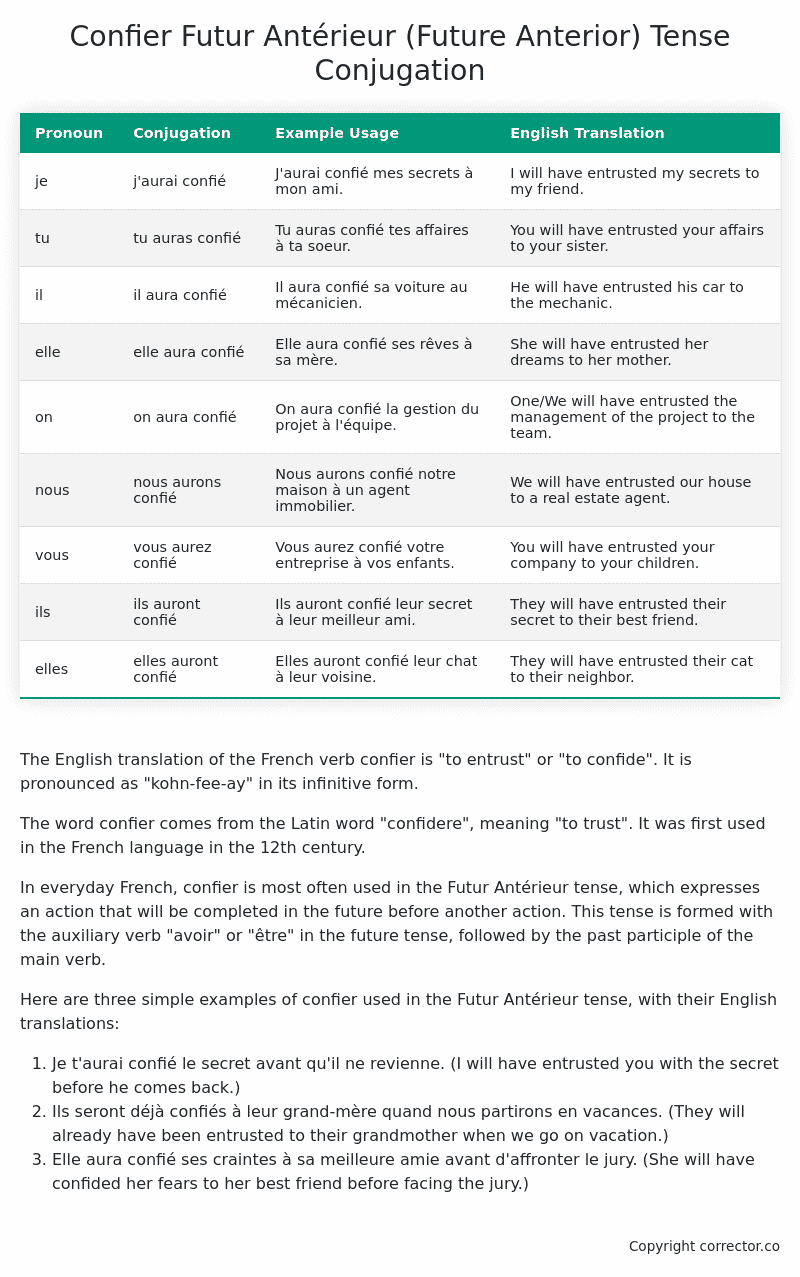Futur Antérieur (Future Anterior) Tense Conjugation of the French Verb confier
Introduction to the verb confier
The English translation of the French verb confier is “to entrust” or “to confide”. It is pronounced as “kohn-fee-ay” in its infinitive form.
The word confier comes from the Latin word “confidere”, meaning “to trust”. It was first used in the French language in the 12th century.
In everyday French, confier is most often used in the Futur Antérieur tense, which expresses an action that will be completed in the future before another action. This tense is formed with the auxiliary verb “avoir” or “être” in the future tense, followed by the past participle of the main verb.
Here are three simple examples of confier used in the Futur Antérieur tense, with their English translations:
- Je t’aurai confié le secret avant qu’il ne revienne. (I will have entrusted you with the secret before he comes back.)
- Ils seront déjà confiés à leur grand-mère quand nous partirons en vacances. (They will already have been entrusted to their grandmother when we go on vacation.)
- Elle aura confié ses craintes à sa meilleure amie avant d’affronter le jury. (She will have confided her fears to her best friend before facing the jury.)
Table of the Futur Antérieur (Future Anterior) Tense Conjugation of confier
| Pronoun | Conjugation | Example Usage | English Translation |
|---|---|---|---|
| je | j’aurai confié | J’aurai confié mes secrets à mon ami. | I will have entrusted my secrets to my friend. |
| tu | tu auras confié | Tu auras confié tes affaires à ta soeur. | You will have entrusted your affairs to your sister. |
| il | il aura confié | Il aura confié sa voiture au mécanicien. | He will have entrusted his car to the mechanic. |
| elle | elle aura confié | Elle aura confié ses rêves à sa mère. | She will have entrusted her dreams to her mother. |
| on | on aura confié | On aura confié la gestion du projet à l’équipe. | One/We will have entrusted the management of the project to the team. |
| nous | nous aurons confié | Nous aurons confié notre maison à un agent immobilier. | We will have entrusted our house to a real estate agent. |
| vous | vous aurez confié | Vous aurez confié votre entreprise à vos enfants. | You will have entrusted your company to your children. |
| ils | ils auront confié | Ils auront confié leur secret à leur meilleur ami. | They will have entrusted their secret to their best friend. |
| elles | elles auront confié | Elles auront confié leur chat à leur voisine. | They will have entrusted their cat to their neighbor. |
Other Conjugations for Confier.
Le Present (Present Tense) Conjugation of the French Verb confier
Imparfait (Imperfect) Tense Conjugation of the French Verb confier
Passé Simple (Simple Past) Tense Conjugation of the French Verb confier
Passé Composé (Present Perfect) Tense Conjugation of the French Verb confier
Futur Simple (Simple Future) Tense Conjugation of the French Verb confier
Futur Proche (Near Future) Tense Conjugation of the French Verb confier
Plus-que-parfait (Pluperfect) Tense Conjugation of the French Verb confier
Passé Antérieur (Past Anterior) Tense Conjugation of the French Verb confier
Futur Antérieur (Future Anterior) Tense Conjugation of the French Verb confier (this article)
Subjonctif Présent (Subjunctive Present) Tense Conjugation of the French Verb confier
Subjonctif Passé (Subjunctive Past) Tense Conjugation of the French Verb confier
Subjonctif Imparfait (Subjunctive Imperfect) Tense Conjugation of the French Verb confier
Subjonctif Plus-que-parfait (Subjunctive Pluperfect) Tense Conjugation of the French Verb confier
Conditionnel Présent (Conditional Present) Tense Conjugation of the French Verb confier
Conditionnel Passé (Conditional Past) Tense Conjugation of the French Verb confier
L’impératif Présent (Imperative Present) Tense Conjugation of the French Verb confier
L’infinitif Présent (Infinitive Present) Tense Conjugation of the French Verb confier
Struggling with French verbs or the language in general? Why not use our free French Grammar Checker – no registration required!
Get a FREE Download Study Sheet of this Conjugation 🔥
Simply right click the image below, click “save image” and get your free reference for the confier Futur Antérieur tense conjugation!

Confier – About the French Futur Antérieur (Future Anterior) Tense
Construction
Common Everyday Usage Patterns
Interactions with Other Tenses
For example
Summary
I hope you enjoyed this article on the verb confier. Still in a learning mood? Check out another TOTALLY random French verb conjugation!


